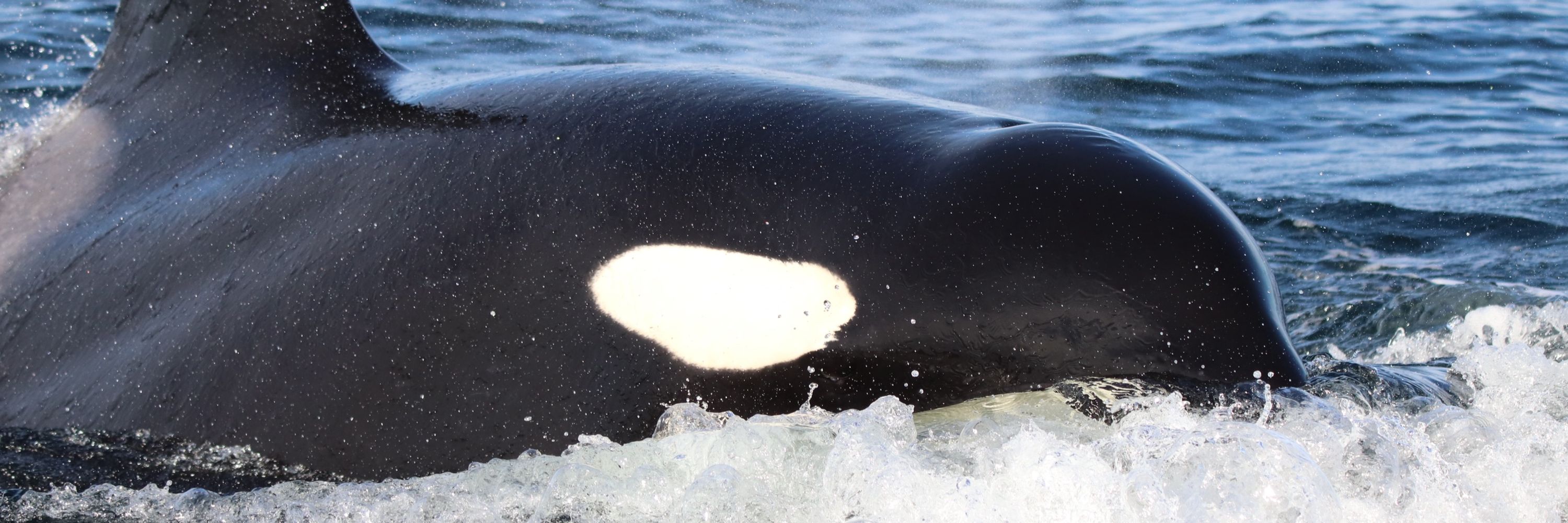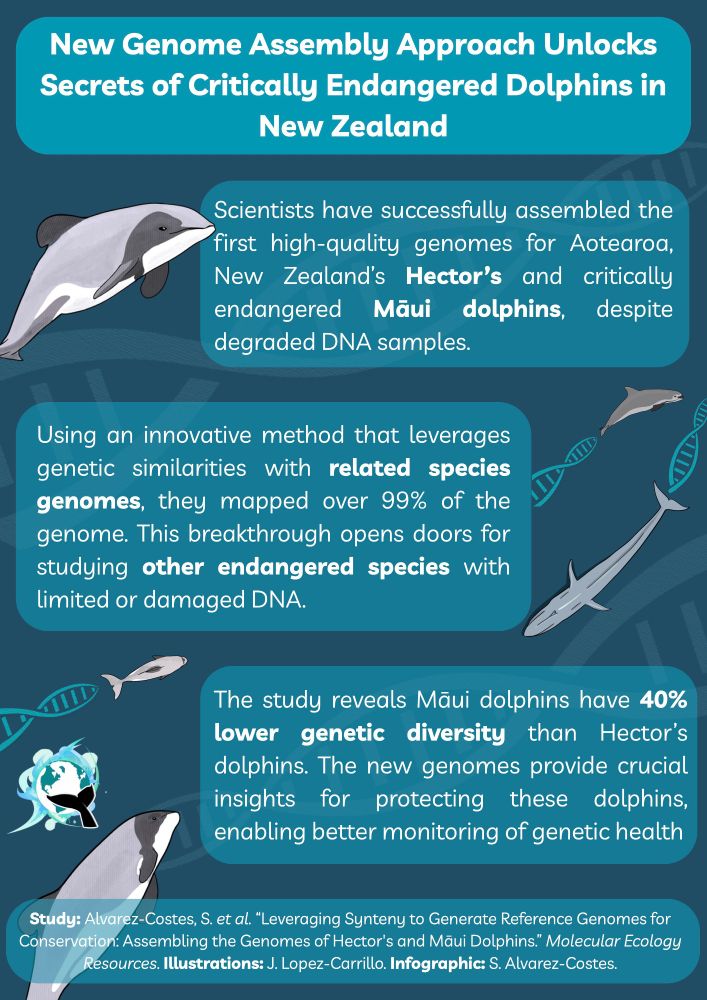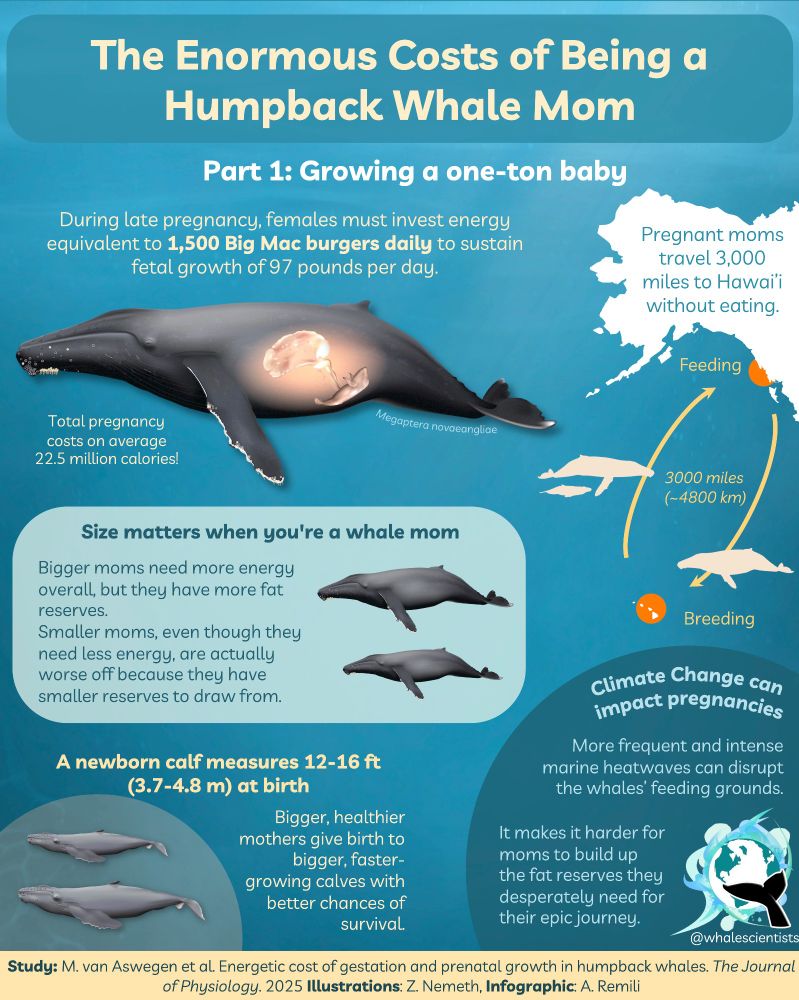
Whale Scientists
@whalescientists.bsky.social
Whale Scientists is a blog created by early-career researchers to share knowledge about whales and dolphins. Our website aims to be a platform where people from all backgrounds can learn a thing or two about marine mammals.
🐬 Fraser’s dolphins in the Caribbean turn out to be the ultimate social networkers, swimming with other species 83% of the time while island-hopping across 229km of ocean.

October 20, 2025 at 4:42 PM
🐬 Fraser’s dolphins in the Caribbean turn out to be the ultimate social networkers, swimming with other species 83% of the time while island-hopping across 229km of ocean.
Can whales smell? The answer is not so simple!

June 11, 2025 at 4:57 PM
Can whales smell? The answer is not so simple!
The recap of the study by Sebastian Alvarez-Costes on his new study! Super fascinating and inspiring work 🐬✨

April 7, 2025 at 9:21 PM
The recap of the study by Sebastian Alvarez-Costes on his new study! Super fascinating and inspiring work 🐬✨
A new and exciting @nature.com Communications study reveals baleen whales operate the planet's largest nutrient transport system, moving tons of nitrogen and carbon from polar feeding grounds to tropical breeding areas. Great job @jjkiszka.bsky.social and coauthors ✨

March 10, 2025 at 4:35 PM
A new and exciting @nature.com Communications study reveals baleen whales operate the planet's largest nutrient transport system, moving tons of nitrogen and carbon from polar feeding grounds to tropical breeding areas. Great job @jjkiszka.bsky.social and coauthors ✨
Find Martin's recap on Whale Scientists: whalescientists.com/humpback-wha... @lbejder1971.bsky.social

January 28, 2025 at 5:21 PM
Find Martin's recap on Whale Scientists: whalescientists.com/humpback-wha... @lbejder1971.bsky.social
New research reveals the extraordinary energy demands of humpback whale mothers, who travel over 3,000 miles without food to birth and nourish their 2,600-pound calves, a feat now further imperiled by climate change and marine heatwaves disrupting their critical food supply.

January 28, 2025 at 5:21 PM
New research reveals the extraordinary energy demands of humpback whale mothers, who travel over 3,000 miles without food to birth and nourish their 2,600-pound calves, a feat now further imperiled by climate change and marine heatwaves disrupting their critical food supply.
New study: Researchers studied how "forever chemicals" (PFAS) are affecting Arctic wildlife, specifically polar bears and ringed seals.

January 22, 2025 at 7:06 PM
New study: Researchers studied how "forever chemicals" (PFAS) are affecting Arctic wildlife, specifically polar bears and ringed seals.
Did you know killer whale poo is green? @anaisremili.bsky.social has been working with some precious samples for a metabolomics project. She told us the shades vary from green-brownish to bright green.

January 10, 2025 at 4:57 PM
Did you know killer whale poo is green? @anaisremili.bsky.social has been working with some precious samples for a metabolomics project. She told us the shades vary from green-brownish to bright green.
This is a tiny condensate so make sure to read the whole story (link in bio) and thank you to all these amazing ladies for their time and extremely valuable advice! @carissaandclimate.bsky.social whalescientists.com/whale-resear...

January 3, 2025 at 6:22 PM
This is a tiny condensate so make sure to read the whole story (link in bio) and thank you to all these amazing ladies for their time and extremely valuable advice! @carissaandclimate.bsky.social whalescientists.com/whale-resear...
To prove it, we asked six inspiring early-career women to share how they carved out their niche in marine mammal science, offering insight and inspiration on where a master’s degree can take you. @emmaluck22.bsky.social @intertidalkendy.bsky.social

January 3, 2025 at 6:22 PM
To prove it, we asked six inspiring early-career women to share how they carved out their niche in marine mammal science, offering insight and inspiration on where a master’s degree can take you. @emmaluck22.bsky.social @intertidalkendy.bsky.social
Dreaming of a career in whale research but worried about needing a PhD? Good news—you don’t need one to contribute meaningfully to the field!

January 3, 2025 at 6:22 PM
Dreaming of a career in whale research but worried about needing a PhD? Good news—you don’t need one to contribute meaningfully to the field!
Ever wondered how scientists identify sperm whales? Traditionally, it’s all about capturing photos of their tail flukes when they dive. But what if the whales don’t dive? Enter drones: a game-changer in marine mammal research.

December 13, 2024 at 5:29 PM
Ever wondered how scientists identify sperm whales? Traditionally, it’s all about capturing photos of their tail flukes when they dive. But what if the whales don’t dive? Enter drones: a game-changer in marine mammal research.
🧪 How To Study The Deepest Diving Whales? Use Chemistry! 🐋
Beaked whales are elusive deep divers, making them tough to study. But stable isotope analysis is changing that!
Beaked whales are elusive deep divers, making them tough to study. But stable isotope analysis is changing that!

November 28, 2024 at 10:55 PM
🧪 How To Study The Deepest Diving Whales? Use Chemistry! 🐋
Beaked whales are elusive deep divers, making them tough to study. But stable isotope analysis is changing that!
Beaked whales are elusive deep divers, making them tough to study. But stable isotope analysis is changing that!
The Australian snubfin dolphin is one of Australia’s only endemic dolphin species, identified as a new species in 2005. This small dolphin is adorable, but it faces conservation threats due to its small population and coastal habitat preference. whalescientists.com/australian-s...

November 27, 2024 at 2:34 AM
The Australian snubfin dolphin is one of Australia’s only endemic dolphin species, identified as a new species in 2005. This small dolphin is adorable, but it faces conservation threats due to its small population and coastal habitat preference. whalescientists.com/australian-s...

